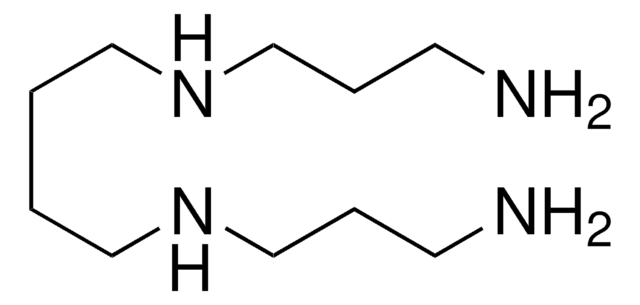51799
Putrescine
analytical standard
Synonym(s):
1,4-Diaminobutane, 1,4-Butanediamine, Putrescine, Tetramethylenediamine
About This Item
Recommended Products
grade
analytical standard
Quality Level
assay
≥98.5% (GC)
shelf life
limited shelf life, expiry date on the label
expl. lim.
9.08 %
technique(s)
HPLC: suitable
gas chromatography (GC): suitable
refractive index
n20/D 1.457 (lit.)
bp
158-160 °C (lit.)
mp
25-28 °C (lit.)
density
0.877 g/mL at 25 °C (lit.)
application(s)
cleaning products
cosmetics
flavors and fragrances
food and beverages
personal care
format
neat
Storage temp.
2-8°C
SMILES string
NCCCCN
InChI
1S/C4H12N2/c5-3-1-2-4-6/h1-6H2
Inchi Key
KIDHWZJUCRJVML-UHFFFAOYSA-N
Looking for similar products? Visit Product Comparison Guide
Other Notes
Recommended products
signalword
Danger
hcodes
Hazard Classifications
Acute Tox. 2 Inhalation - Acute Tox. 3 Dermal - Acute Tox. 4 Oral - Eye Dam. 1 - Met. Corr. 1 - Skin Corr. 1B
Storage Class
6.1B - Non-combustible acute toxic Cat. 1 and 2 / very toxic hazardous materials
wgk_germany
WGK 1
flash_point_f
113.0 °F - closed cup
flash_point_c
45 °C - closed cup
Choose from one of the most recent versions:
Already Own This Product?
Find documentation for the products that you have recently purchased in the Document Library.
Customers Also Viewed
Our team of scientists has experience in all areas of research including Life Science, Material Science, Chemical Synthesis, Chromatography, Analytical and many others.
Contact Technical Service







